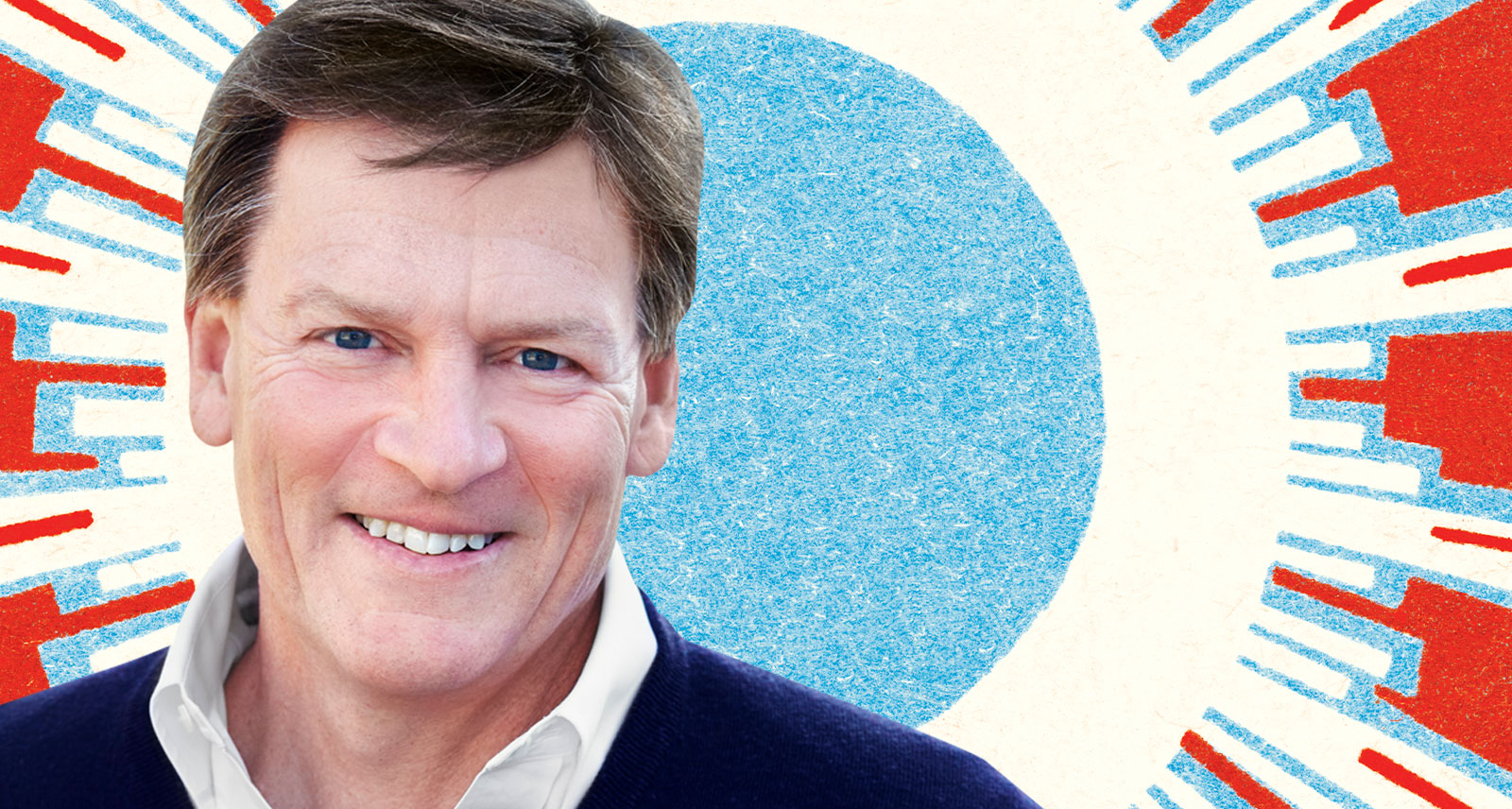Bestselling Author Michael Lewis on Writing, Wall Street, and His New Podcast Series
When best-selling author Michael Lewis wrote his first book, Liar’s Poker, in the late 1980s, he thought it had a limited shelf-life. For one, the book chronicled his experience as a twenty-something bond salesman on the trading floor of Salomon Brothers, where he was offered boatloads of money by the now defunct investment bank to offer clients financial expertise he didn’t really possess. He wasn’t unique. Across Wall Street, recent college graduates were making their own mini-fortunes offering clients similarly half-baked financial advice. For Lewis, Wall Street was clearly out of control. He assumed it would soon be reined in and that Liar’s Poker, accordingly, would offer little more than a glimpse into a bygone era of unprecedented greed.
But more than 30 years later, Liar’s Poker remains the defining book about life on Wall Street, not only for its depiction of the frat-boy behaviour that dominated the Salomon Brothers’ trading floor, but because it still offers plenty of insights into how Wall Street operates today. Lewis was struck by these connections when he sat down to record a new audiobook version of Liar’s Poker, along with all the other thoughts that came with revisiting the first book in his writing career dotted with best-sellers (some of which have been made into movies, like Moneyball, The Blind Side, and The Big Short). The result is Other People’s Money, a new podcast set to release next month as a companion to Liar’s Poker that offers listeners a behind the scenes look at the book’s beginnings, along with chance to hear from some of the book’s characters and to hear Lewis revisit his earlier self.
SHARP recently spoke to Lewis about writing, Wall Street, and why Liar’s Poker remains relevant.
First off, are you surprised that Liar’s Poker is still being read more than 30 years after it was first published?
Totally. I thought it was a “message in a bottle” for people 100 years from now. The way people might want to go back and read about the crash of ’29, they’d one day think: “huh, I wonder what that was like back in the weird ‘80s”. What I missed was that I was in the beginning of a much longer story. There were these big Wall Street trends that got going on the Salomon Brothers’ trading floor that just kept on going.
Having said that, the finance world is so different now than when I was in it — the central character in Liar’s Poker is the bond salesman and they basically don’t even exist anymore — but, in the very crude strokes, it’s the same in that the Street is even better at sucking in the young brains from MIT and Harvard and Yale and so on. Instead of wanting to go into productive industry or academia or something that’s useful to society, the best and brightest instead go to Wall Street and seek rich. I see my royalty statements — 30,000 or 40,000 copies of this thing are still selling every year — but I didn’t really know who to. But my daughter came to me about 18 months ago and said, “Two of my friends just came back from Wall Street jobs and they were made to read Liar’s Poker to understand Wall Street”. And I was shocked. One, it doesn’t seem like the same place, but then I realized that it has actually become this thing that older people on Wall Street hand to younger people on Wall Street.
Why?
I think part of what’s going on is that Wall Street has gotten a lot more tedious. The work isn’t exciting. It’s not fun. [And then] there’s this document [Liar’s Poker] that makes it seem like fun — that wasn’t my intention — but it was a place full of life. People are actually talking to each other. They aren’t sitting in little cubes just pecking away at a laptop. So, I think that’s part of why it’s survived: as [the business has gotten] dehumanized, nothing else has come along to completely supplant [the book]. The material just isn’t as good. The Wolf of Wall Street would have been the closest thing to come along and knock Liar’s Poker off the shelf, but because it wasn’t really about the centre of Wall Street but this weird periphery, it didn’t really do it.
So, am I surprised that the book still has this market for it? Yeah! Totally. I thought this place changes so fast it would feel irrelevant.
You mentioned that you didn’t realize back in the ‘80s that you were actually inside the beginning of a much longer story on Wall Street. What is that longer story, and how are we connected to it today?
The first thing I’d say is the intellectualization of finance. Technology made it possible for it to get very complicated. And I was walking into the beginning of that period where suddenly it wasn’t guys who were trading by their gut in charge of these firms. Wall Street went from being guys at the craps table to card counters at the blackjack table. It became a lot more precise, analytical, data-driven, and so the kind of person who ends up making these financial risk decisions is a different kind of person. That’s one thing.
[Another thing is] the bets in securities used to be made by partnerships, so there was just not the same risk appetite because you were playing with your own money. The transformation of the investment banks into now massive corporations where they use shareholder capital rather than their own money [means] you’re sort of making bets with other people’s money [rather] than your own money. That changes what people do.
The rapid change in finance means Wall Street is unrecognizable in a lot of ways. The difference between what Wall Street looked like in 1970 and 1920 is nothing compared to what it looks like between 1970 and now. And rapid change really favours youth. I remember back during the first internet bubble, there was a sociologist in Silicon Valley that made the point that the effects of rapid technology change are very similar to what you see in immigrant families, where the family moves to the U.S. and the parents don’t speak English and the little kid is soon running circles around their parents because they picked up the language. It destabilizes parental authority. That destabilization of authority [on Wall Street] started happening in a big way back in the ‘80s and it’s never stopped.
That was the jaw dropping thing I was reminded of when I was reading the book: I was in rooms with [Salomon Brothers’ CEO] John Gutfreund when I was a few years removed from college without any training in business, and I was telling him his business. That’s insane. But that insanity persists and it’s one of things at the bottom of the financial crisis in 2008: the people running the firms didn’t understand what was going on in their own firms. That is a modern phenomenon that tethers Liar’s Poker to now.
So, broadly speaking, the pace at which technology moves means the industry remains deregulated — too deregulated?
If the people who are running the firms don’t understand what’s going on in their own firms, what chance do regulators have? The broader point is that it doesn’t matter how ostensibly transparent the business is if it’s that complicated, because the complexity is a form of opacity; the complexity makes it difficult for people to understand what’s going on.
In the podcast’s first episode, you mention that the literary strength of the book is its moral weakness: you told the story but didn’t tell the reader what to think. Clearly, not everyone that reads Liar’s Poker comes away with what you thought it said: that finance is a hollow industry that doesn’t offer anything useful to society. What’s it like to have this book that made you a literary star be interpreted so differently by so many people?
It was so revealing, and it’s a truth that’s been revealed to me each time I publish a book: you write your book and you think it says whatever it says, but the reader reads his or her own book and they see whatever they want to see.
I’m a little fatalistic about this: I don’t think the solution is to try and muscle around the reader and tell them what to think; I think that becomes a very dull experience. But about a decade ago, a philosopher from Oxford wrote a really angry but thoughtful letter to me about how he’d watched me not once but twice — because The Big Short had just come out — turn the heads of his students and make them even more interested in wanting to go into finance. And he blamed me for making it too much fun. He was really taking me to task for it. It’s the only time anybody has ever really done that, because I’ve always thought my job is just kind of to get what happened down on the page, not muscle the reader around to any kind of conclusion. But it’s not an unfair charge that in making everything seem so much fun and exciting in Liar’s Poker, it just threw kerosene on a fire.
Having said that, for every person who tells me they went to work on Wall Street because of Liar’s Poker, there’s half a person who tells me “I read it and decided that wasn’t for me”. People jump both ways.
In the book, it’s such a bizarre business because what might be good for the firm might be the opposite of what’s good for the client, which is something you lay out clearly.
Between the lines of Liar’s Poker and not so between the lines of The Big Short and Flash Boys [is that] Wall Street is such a pure case study of the power of incentive. People will do what they’re incentivized to do, even if it’s horrible for the world. They won’t even notice it’s horrible. They’re just following their interests, and people on Wall Street are particularly good at identifying their interests and following them. If you create these perverse incentives, people will do perverse things.
I was an example of that when I was sitting on the trading desk; I had the perverse incentive to get customers to do stuff they shouldn’t do — and I felt it. I couldn’t sleep nights. It was really uncomfortable, but it was just kind of normal.
So, was the book a natural reaction to all of this absurdity or did you go into the Salomon Brotehrs well aware that you could mine stories from it?
I knew I wanted to be a writer when I went to work at Salomon Brothers. [What] I didn’t know was if I was going there to make a bunch of money so I could go then be a writer without having to worry about money, or if I was going to Salomon Brothers to learn about stuff that I would one day write about. But even if it was the latter, I wasn’t walking into the place [with the intention of] writing a book about my experience. I was going to learn about finance, how the world worked, and the absurdity of rich people. I was walking into the place because I thought writers make a mistake in thinking that they’re just writers and that they don’t have to go out and have experiences and learn about things. For me, it was just a way to get an education.
And that ultimately makes for one of the book’s greatest assets: nobody knows there’s a writer in the room.
That was the only guilt I felt. No one ever said it was okay for me to write a book. It was funny: when I walked out and said I was writing a book, they didn’t seem to care. They were more worried about my sanity because I was quitting this job that was paying me all this money. But the story I told myself to ease my conscience — and it actually worked — was that the firm so betrayed its employees, was so badly mismanaged, and didn’t actually care about its people towards the end that it was hard for me to get too worked about caring for them. But there’s no question that it was a total betrayal.
But the culture of the firm told you at every turn that being self-serving is good and commendable. The twist is that, for you, that meant writing a book rather than making more money for them.
[Laughs.] It’s true! They kind of trained me to do what I did. That comes out in one of the episodes: all the emphasis from the top of the firm [after the book was published] was to make sure I didn’t make any money. “You can read the book, but don’t buy the book”.
Yeah, there were those mimeographed copies, right?
They were passing them out in the training class! They were just like photocopies, which, by the way, is highly illegal. [Laughs]
The show is also an opportunity for you to look at yourself as a young writer. You mention how in the book you can hear yourself imitating others — Henry Adams and Tom Wolfe, among them — but could you also hear hints of your own voice?
It was such an odd experience reading it. Sometimes I felt like I was reading a book I wrote and sometimes I felt like I was reading a book somebody else wrote that I had nothing to do with. But there is a moment in it where I thought “Yeah, there I am”. It was the first time I didn’t hear someone else. [The passage in the book is] the first time that I ripped off a customer, without knowing I was doing it. I thought I was being clever when I put that poor German into those AT&T bonds — the truth was he was Austrian; I felt like I had to disguise him —[but I think I was both] enthralled and outraged by the experience, and the story just felt so compelling that I think I just forgot about everybody else and just wrote it. That passage goes on for like 10 or 15 pages and it’s the first time that I didn’t wince. It’s not that it’s perfect or couldn’t be improved, but it just didn’t feel like there was some other voice in my head. It was just mine.
How do you like podcasting versus writing?
It feels like instead of riding a bike all the time, I’m getting to swim. There are other muscles you work when you’re writing — or, in this case, talking — for the ear. It makes you a little more sensitive to sound and the relationship between sound and sense. And it’s a useful thing because it feeds back into the book writing and makes it stronger. It also gives me something to do after a book is done, so I put space between the books and it takes the pressure off. That way, you let the next book walk in the door rather than trying to force it.
As part of the Hot Docs Podcast Festival, Michael Lewis will be speaking to This American Life creator Ira Glass on January 26th about their respective bodies of work. Head over to Hot Docs for more information.










